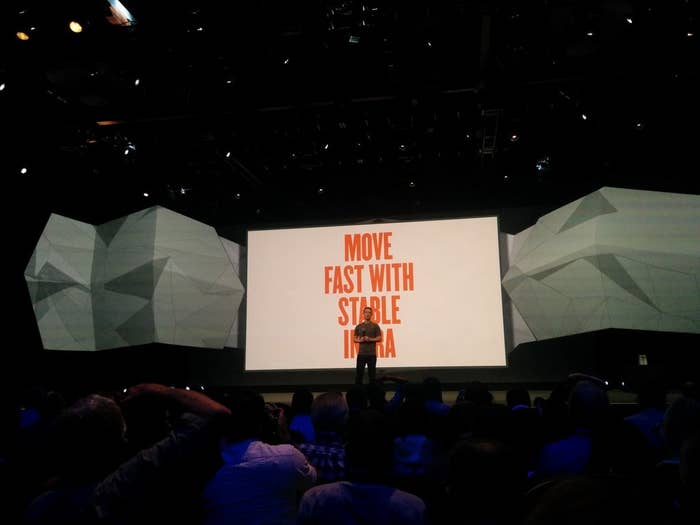
In its earliest days, Facebook was able to outmaneuver larger companies like MySpace or Google by pushing updates quickly and tolerating a few bugs along the way.
Now Facebook is a large, publicly traded company worth more than $100 billion and that isn't going to work any more — and Facebook CEO Mark Zuckerberg knows it. So, at the company's annual developer conference in San Francisco, he's preaching stability in an effort to attract developers that will build applications using Facebook.
"Move fast with stable infra might not have the same ring to it, it might not be as catchy," Zuckerberg said. "But it helps us build better experiences."
In terms of the nitty-gritty details, Facebook said it's going to ensure that the functions developers use, like logging in with Facebook, will be stable for at least two years. In industry parlance, this is called "API versioning," and it's a big change from the company's traditional strategy which often saw developers complain that Facebook would "break" their apps when they update their APIs.
Facebook also said it would fix any bugs within 48 hours of new code being released to developers. In essence, Facebook's "move fast, break things" era seems to be over — for good reason, as the company now not only has to make its case to its billion-plus users, but also investors. Not only did Facebook move to satisfy developers and Wall Street with stable product, but it also introduced a new, anonymous version of its login system for third-party apps that's aimed at assuaging consumer fears about giving up data.
In the past, Facebook's case to developers has been that its user base is large enough for them to be tolerant of its rapid updates. But now Zuckerberg seems to be making the case that Facebook will be a "stable mobile bridge" across platforms like the iPhone, Android, Windows Phone, and the web.
One way it will do that is through Parse, a developer toolkit that Facebook acquired last year — beating out a number of other large tech companies in the process — that powers many of the behind-the-scenes functions of more than 260,000 apps.
The strategy shift makes sense for Facebook given that both Apple and Google have sought to attract as many developers to their platforms as possible — including even offering preferential placement for exclusive apps. Facebook's case seems to be that it transcends and links those platforms, a separate kind of value proposition to individual platforms.
"On Facebook's 10th anniversary we brought the whole thing together, and we talked about our culture," Zuckerberg said. "We have this strong hacker culture, it's helped us accomplish so much. But we also talked about how our hacker culture is inherently focused on us, it's not focused on the people we serve. To reach the next level, my goal for our culture over the next 10 years is to build a culture of loving the people we serve as strong as our hacker culture if not stronger. We want to build a platform that's reliable for you."
In another move that will likely please investors, Facebook said it was rolling out its own mobile advertising network. That will allow advertisers to use Facebook's data — which is consider to have one of the best user data sets in the industry — target ads on other applications.
Taken together, it's a set of updates that won't necessarily have dramatic implications for the end users of Facebook — but that's not really what Zuckerberg was going for at the conference today, which is centered around developers.
"We want to help you guys touch more peoples' lives," Zuckerberg said. "We've already done so much together, I'm really confident this path forward is the way."
